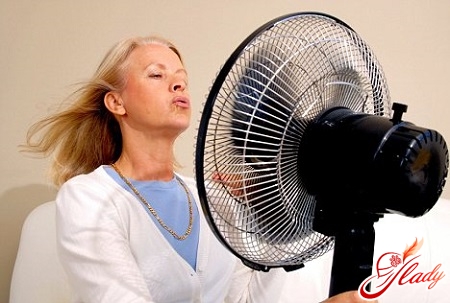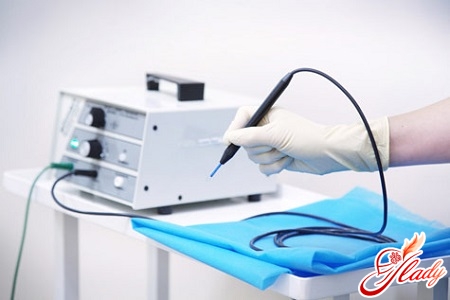
Menopause is naturala physiological process that is accompanied by age-related changes in the sexual sphere. In particular, it means the fading of the female reproductive system. Many women regard menopause as the beginning of the end, but this is fundamentally wrong. Despite the fact that this period can cause many difficulties and unpleasant moments, they can nevertheless be leveled out. It is enough to know how menopause begins and how to behave correctly during this period.

What is menopause and when does it begin?
As is already known, menopause is a periodwhen the functions of the reproductive system begin to decline. The cause of menopause lies in the change of hormonal levels, namely in the decrease of sex hormones in the body. In addition, if we are talking about premature menopause, the reasons may be different, for example:
- life situations that caused very severe stress;
- Immunological diseases of the thyroid gland;
- Sexual infections that were observed during puberty;
- removal of ovaries and uterus;
- production of a reduced amount of hormones in the ovaries.
Depending on geneticspredisposition menopause can occur in each woman at different ages. Normally, the climacteric period occurs at 40-45 years. But after 30 years, a gradual decrease in estrogens begins, the supply of which is depleted by 40 years so much that the maturation of eggs stops. Hormones continue to be produced for some time, but their level decreases and cannot reach the required concentration. The onset of menopause is directly related to the complete cessation of hormone production. In addition, there are cases of early (artificial) - before 40 years - and late menopause - after 55 years. Usually, women under 40 do not even think about this problem. At the same time, doctors note that cases of early menopause have become more frequent recently. Therefore, even at a young age, in order not to miss the possible onset of artificial menopause, you need to know what symptoms it is accompanied by. On the one hand, you will be psychologically prepared for the changes that your body undergoes. On the other hand, you can seek help from a doctor in time. Of course, menopause is not curable, but adequate therapy prescribed by a gynecologist can significantly alleviate the symptoms that accompany menopause. As for late menopause, it should be noted that although it does not bring any unpleasant sensations or psychological problems to a woman, it is dangerous because it is very often accompanied by the development of tumors. Therefore, at any age, a woman must undergo regular examination by a gynecologist. Usually, the climacteric period lasts for 1.5-2 years, but everything is individual. Each woman experiences it differently: someone does not notice any changes in the body, and someone suffers greatly from unpleasant symptoms.
Stages of menopause
The climacteric period is divided into three mainstages. If you have an idea about them, you will more easily endure menopause from an emotional point of view, since you will understand what is happening to you. This is a very important aspect, which will be discussed below. For now, we should consider the stages of menopause.
- Stage one - premenopause
This stage occurs in women after the age of40 years. It is characterized by a decrease in the body's production of estrogens, which manifests itself in the form of irregular menstruation, changes in the nature of discharge (they can increase or decrease). This stage does not cause any strong physical or psychological discomfort. It can last up to 10 years.
- Stage two - menopause
In fact, this is the stage of menopause itself.It is characterized by the fact that estrogens are practically not produced, which is accompanied by a complete cessation of menstruation. The period of the onset of menopause begins from the moment of the last menstruation. It lasts 1 year.
- Stage three - postmenopause
It comes a year aftermenstruation has stopped, that is, after the second stage. This stage lasts from 3 to 15 years. Its duration depends on how easily the body adapts to the changes that have occurred in it, how much the endocrine system can rebuild itself under them. This stage is insidious in that it can significantly worsen a woman's health and bring a bunch of diseases: osteoporosis, pathologies of the cardiovascular system or thyroid gland.
Psychological aspect of menopause
Menopause is insidious in that, along with physicalwith unpleasant symptoms it damages the psycho-emotional sphere, and subsequently the nervous system. The climacteric period begins with a change in the emotional background: sharp mood swings from cheerful to depressive, irritability, tearfulness, increased vulnerability, insomnia, chronic fatigue, some experience a feeling of uselessness and loneliness, depression, increased activity is replaced by apathy and indifference to everything, fixation only on one's condition, fear of another attack of hot flashes - all this is far from a complete range of sensations and experiences familiar to many women during menopause. Therefore, it is very important how you set yourself up. As soon as you suspect the onset of the climacteric period or the doctor has diagnosed you with menopause, you must set yourself up correctly. First of all, you must remember that menopause is an unpleasant phenomenon, but temporary. And if you discussed with your doctor the issues of how you can help yourself with medication, then this condition can be smoothed out. Secondly, do not repeat the mistake that many women make: do not withdraw into yourself, do not limit your social circle, do not subordinate your life to menopause. On the contrary, continue to lead an active lifestyle, communicate with friends and relatives. It is great if you have some hobbies, and if not, then just devote more time to yourself. You also do not need to be afraid of the changes that are happening in your body, get irritated because of them and, even more so, take out your irritation on others. Often, a woman’s close circle suffers from her new condition - her husband, children. Therefore, it is very important to learn to control your emotions, and even better - not to give in to them. Thirdly, give yourself pleasant emotions. This rule comes down to one: do more often what you like. Go to museums or exhibitions if you love art; play sports - This will not only bring pleasure, but also strengthen your health and prolong youth, meet with your girlfriends. By the way, about communication. It is good if you communicate with women of your age who are also going through menopause. Such communication can be useful, especially if you are very worried about your current condition and want to discuss it with someone. But it is important not to get completely absorbed in the problem. You must understand that you are not alone in what is happening to you. A huge number of women experience the same worries, experiences and physical ailments during menopause. And finally, it should be noted once again that menopause is not a problem in the literal sense of the word. This is a new round of life, which, just like other stages, opens up something new for you, and your task is to find and accept the opportunities that this stage provides.
Symptoms that accompany menopause
There are some common symptoms thatis accompanied by menopause. It is noteworthy that some women suffer from literally all of them, while others may not experience them. How hard or easy a woman experiences this period depends on the level of estrogen and the speed at which it decreases. If the hormone level before menopause was not very high and decreases gradually, then menopause will begin asymptomatically, and the woman will not feel much discomfort. But if the hormone level was high and decreases sharply, then the woman will experience the menopause very hard. Menopause begins with a change in the emotional background, namely - with the appearance of emotional lability. If, along with this, changes in the menstrual cycle begin, it becomes irregular, then this is the first harbinger of menopause. Therefore, it is very important for every woman to pay due attention to this. At the initial stage, menopause is accompanied by the following symptoms:
- bouts of hot flashes, or hot flashes. These attacks are characterized by a surge of blood to the head, to the face, while there is an increased palpitation and pressure. Along with the fact that this condition causes a huge discomfort, many women frighten it, which further exacerbates the picture. Therefore, it is important during the attack to calm down and relax, thereby you will more easily suffer an attack, it will quickly pass;
- sleep disturbance. Some women may have insomnia, some, on the contrary, have increased drowsiness. It is better not to solve sleeping problems yourself with the help of medications, but to consult a doctor;
- trembling of the limbs, excessive sweating, flies before the eyes, there may be muscle spasms;
- changes in appearance: the skin, hair and nails become more dry, brittle and thin.
Then the symptoms either change, or other symptoms are added to the existing ones:
- urinary incontinence, which can be either mild or severe;
- the mucous membrane of the vagina is dried;
- there is a decrease in sexual desire.
At this stage it is very important to pay due attentionpay attention to your health, since it is at this stage that menopause not only causes discomfort in everyday life, but also begins to actively destroy health. If you let things slide, cardiovascular pathologies, metabolic disorders, osteoporosis, atherosclerosis, etc. may begin. If you have already discovered any health problems, hurry to contact a specialist to help your body as soon as possible and prevent the problem from getting worse.









